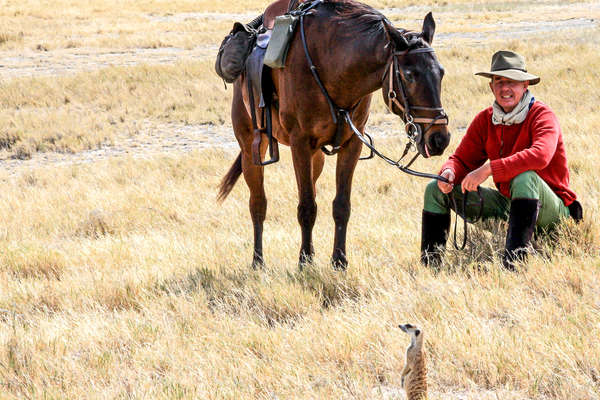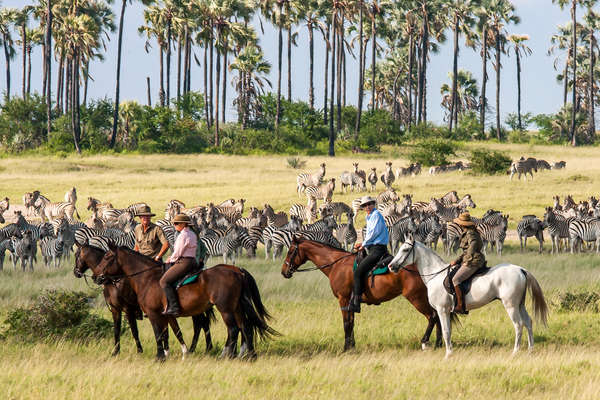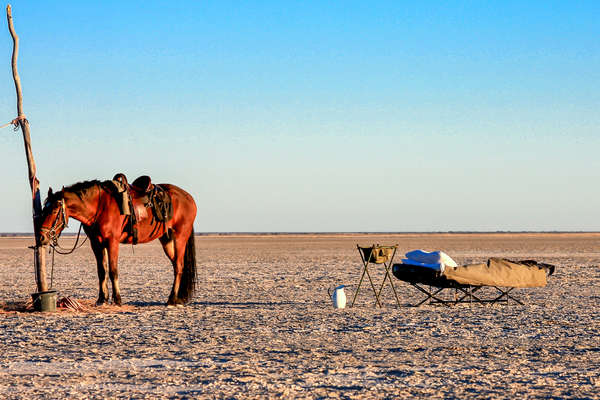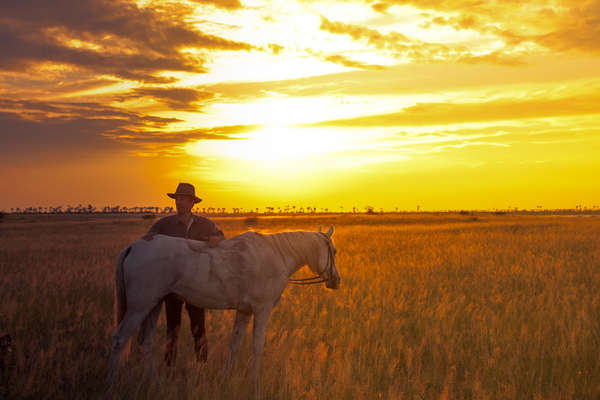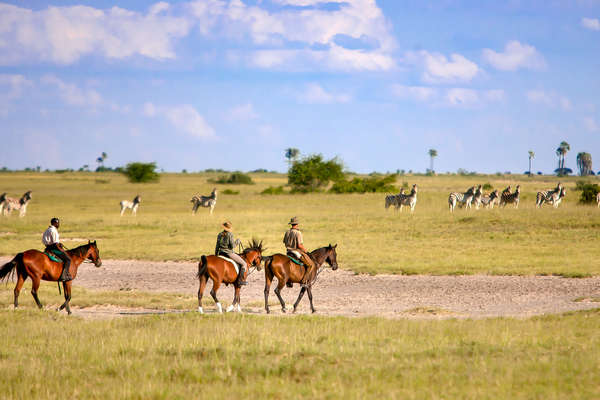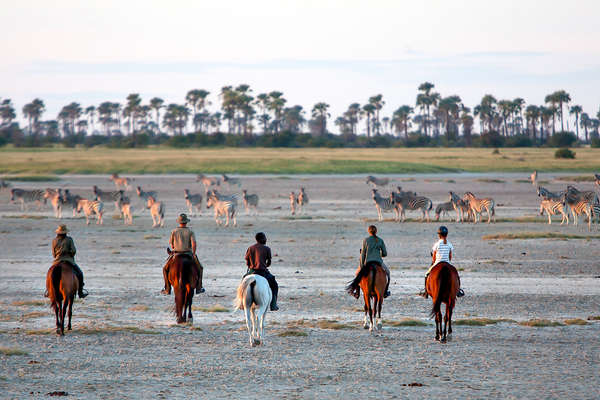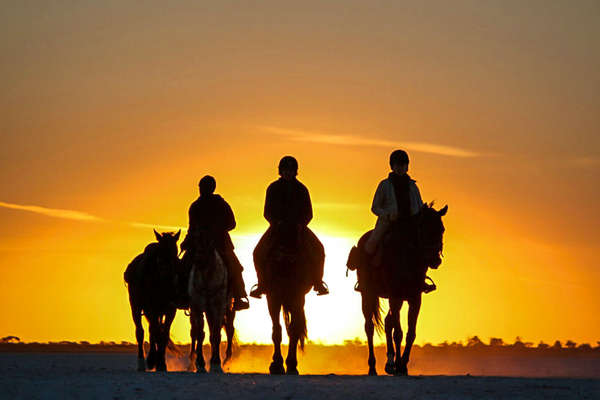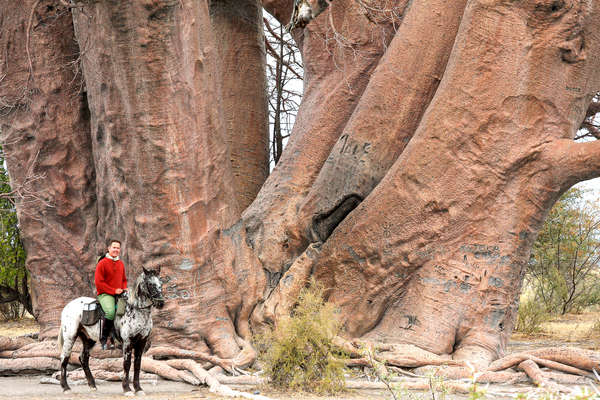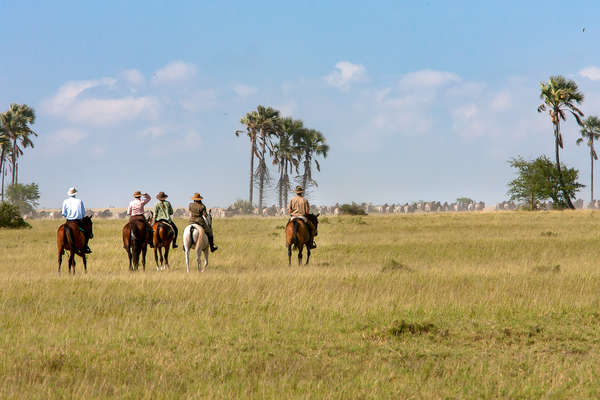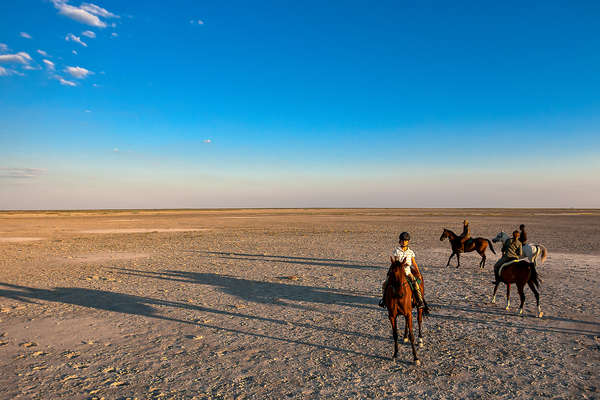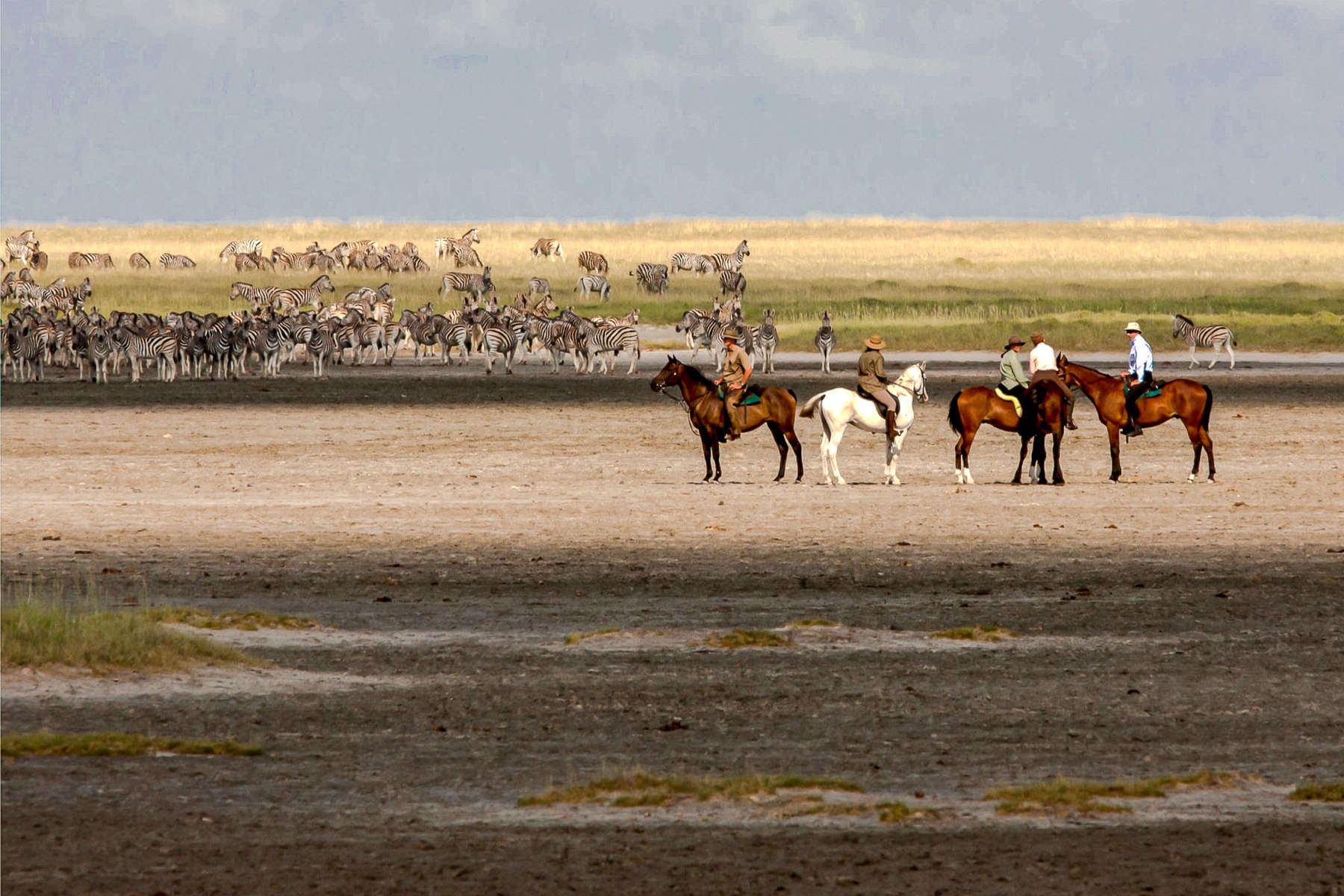
Itinerary
Highlights
- The chance to interact with a habituated family of fascinating meerkats
- Meet with the Bushmen of the Kalahari desert and learn their survival habits
- Explore the unusual vegetation found in the Kalahari, with its baobabs, rare fauna, and wildlife such as the brown hyena
- Experience the second largest annual migration of zebra and wildebeest in the world (during the wet season, January - May)
- Gallop across the salt pans (during the dry season, from June to September)
Dates & prices
Price details
- Flights to your destination (Maun) are not included, but can be booked on request - please contact us for rates.
- Rates are per person, based on two riders sharing a twin or double tent during the ride. Prices quoted are for riding out of Camp Kalahari but prices out of Jacks or San Camp can be provided on request
- Groups are composed of a minimum of 2 riders and a maximum of 8 international riders, plus guides.
- Transfers: you can either get a scenic flight into camp (50 mins each way) or opt for the road transfers (3 hours each way).
> Air transfers from Maun to camp are $1000/£800/€940 per person
> Road transfers are $500/£400/€470 per person
Those prices are based on two travellers sharing the same transfers, a supplement for single travellers may be invoiced if there are no other guests landing or driving into camp at the same time.
Important: Road Transfer may not always allow for time to experience the first afternoon’s activity and the final mornings activity depending on onward travel details
- There is no single supplement if you are willing to share a room/tent with another guest of the same sex. To guarantee your own tent there is a single supplement of between approximately $325 (£260/€300) to $375 (£300/€350) per night - please contact us for an exact quotation.
.
- Non riders can accompany the safari subject to availability and at the our discretion. An itinerary will then be proposed and costed on enquiry.
- IMPORTANT : the usual weight limit is 95kg but please enquire if you weigh more than this as there may be one or two horses capable of carrying up to 105kg.
Please Note
The itinerary may be modified at anytime for security reasons, meteorological or events beyond our control such as blocked roads, rivers in flood, drought, strikes and local holidays. Equus Journeys, our local partners and their local guides will always strive to find the best solution and will alter the itinerary as needed.
The names of the hotels and accommodation are given for information only and depending on availability, they may be modified without notice and replaced by another of a similar standard.
Price includes
Support Team
1 back-up guide
Logistic
1 support vehicle
Accommodation
Meals
All drinks
Extra
Price doesn't include
Meals
Transports
International flights
Extra
Insurance
Optional
Accommodation
Equestrian info
Horses
Guide & local team
All rides will be led by a professional experienced guide. He will be accompanied by an assistant back up guide. Guides will be up to date on their first aid training and will carry a basic first aid kit on all rides. A GPS and a handheld radio or satellite phone are also carried in the event of an emergency.
Minimum riding ability
Minimum riding ability
IMPORTANT : the usual weight limit is 95kg but please enquire if you weigh more than this as there may be one or two horses capable of carrying up to 105kg.
Pace
Tacking ability and participation
Trip conditions and Requested experience
Guests who do not ride regularly are requested to get fit prior to the ride. It is of particular importance to ensure you are comfortable and balanced when riding at speed across rough terrain and open spaces.
Equestrian equipment
Water bottles holders are provided on each saddle (enough space for two saddles). Saddle bags are available.
We recommend our riders to wear a helmet to the correct standard and you should bring your own to ensure a proper fit.
Travel info
Comfort
A laundry service is included. There are camera charging facilities in the camp and limited WiFi.
Meals
Lunch is also light and may be quiche and salad or a variety of salads with cold meats.
Dinner is three courses. Wine is served with the meals and a selection of drinks are available.
Drinks are included and there is a well-stocked bar and fridge with a variety of alcoholic and non-alcoholic beverages.
Vegetarians and special diets can be catered for with advance notice.
Climate
Summer (Nov - March) is hot and there is the chance of dramatic thunderstorms.
Tips
- Guide: US$ 10 per day per guest
- Stable Staff: US$ 5 per day per guest
- Camp Staff: US$ 5 per day per guest
Packing list
- Please don't take a hard sided suitcase. Your luggage should be soft sided, particularly for light air transfers. There is usually a luggage limit of 20kgs including hand luggage.
- Wherever possible you should wear neutral colours, such as beige, brown or natural bush colours for riding as bright colours, such as red, yellow or white can startle the wildlife and they will see you long before you've seen them
- We recommend travelling in your riding boots and carrying your hat and some riding clothes in your hand luggage - then if your luggage goes astray you are still able to ride!
Head
- Equus Journeys strongly recommend that you wear a riding helmet and that you take your own to ensure a correct fit.
- Sunhat for when not riding
- Sunglasses - with a cord attached so they don't fly off when riding
- Buff or bandana
Upper body
- Long sleeved shirts provide protection from the sun and thorns
- T-shirts
- Fleece, jumper or jacket - the evenings can be cold, particularly June - August.
- Waterproof jacket - the rains can be difficult to foresee and it's better to be prepared. Rain is more likely during the months of Oct-April.
- Casual clothes for the evening
Legs
- Lightweight, comfortable riding trousers or jodhpurs - we recommend riding in them at home before taking them on holiday to ensure they don't rub
- Shorts for lazy lunchtimes
- Casual clothes for the evening
Hands and Feet
- Comfortable riding boots. We recommend short boots with half chaps but you may wish to take long chaps to protect against thorns. We don't recommend taking your favourite long leather boots in case they get damaged
- Sandals, flip-flops or trainers for moving around the lodge and camp
- Gloves - your hands are particularly exposed to the sun whilst riding
Nightwear
Other useful items
- Swimsuit - for plunge pools
- Binoculars for viewing game
- Camera and high capacity memory card. Spare battery
- Bumbag for carrying your camera and small items whilst riding
- Headtorch or small torch for moving around camp at night
In your luggage
- Any liquids, such as shampoo, moisturiser, deodorant unless they are less than 100ml and all bottles can fit in a small, clear, plastic ziplock bag. Some toiletries are provided by the camp so you can pack lighter.
In your hand luggage
- Any valuables, such as your camera, ipod, ipad etc.
- Your riding hat
Medical kit
- Sunscreen and lip balm - must be high factor
- Insect repellent, preferably containing deet
- Any medication you regularly take
- Blister plasters in case of any rubs
- Antiseptic cream, plasters, aspirin, anti-histamine, insect-bite salve etc...
- Spare prescription glasses/contact lenses
- Anti malarial tablets and Yellow Fever Certificate if required (check with your doctor)
Sustainable tourism
- Travel light. It's a little known fact, but the lighter you pack, the better for the environment as heavy bags will produce higher emissions (when flying a plane or driving a car!).
- Reduce plastic waste. Take your favorite reusable bottle with you. Avoid single-use bags, cups, or straws.
- Preserve nature. Always take your rubbish with you during the ride and recycle them. Leave all the flowers or plants as you found them, and never get too close when observing wildlife. Make sure to use eco-friendly products such as body wash or laundry detergent (if camping) to protect both your skin and the environment.
- Choose your experiences carefully. Respect animal life by not participating in any activities that abuse wild animals (shows, elephant rides, etc.).
- Support local populations. Buy local handicrafts, be respectful of customs, and learn about the culture of local communities.
- Share! Raise awareness among your family and friends about sustainable tourism.
Did you know?
Did you know?
The meerkats
They are little carnivorous mammals that live in colonies of 20 to 30 members.
In order to find their food, they have to dig deep into the ground, sometimes deep enough that they have their head buried in the sand and can't hear predators. Meerkat "Guards" have a role within the colony to warn others of the presence of predators by specific cries. They have identified 30 different cries according to the type of risk (terrestrial or aerial) and their distance away. An unbroken cry indicates that everything is going well. If there is danger, the guard barks or whistles very loudly. Then the group run back to their holes.
During
your riding
safari in the Kalahari, you will likely come
across a lot of meercats and will be geared up to recognise their cries.

